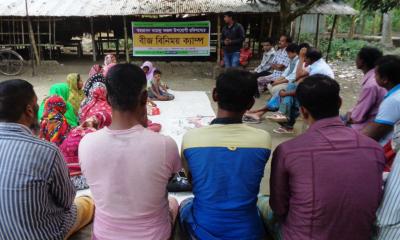RAJSHAHI, Nov 22, 2017 (BSS)- Speakers at a farmers meeting here said that cultivation of drought-tolerant and less-water consuming crops can be the vital means of lessening the gradually mounting pressure on underground water.
They said large-scale promotion of less-water consuming indigenous crops has become indispensable to mitigate the water-stress condition in the drought-prone Barind area.
The observation came in a daylong seed exchange camp farmers meeting at Bilnepalpara village under Paba Upazila in the district on Tuesday.
Two non-government organizations, Bangladesh Resource Centre for Indigenous Knowledge (BARCIK) and Peoples Organizations in Barind area, jointly organised the camp. More than 50 farmers both male and female were given seeds of vegetables and some other drought tolerant indigenous crops free of cost on the occasion.
Upazila Chairman Ishaque Ali, Sub Assistant Agriculture Officer Toyeb Ali, BARCIK Barind Region Coordinator Shahidul Islam and its Associate Agriculture Officer Amrita Kumar Sarker and Organizing Secretary of Bilnepara Farmers Club Nurul Islam addressed the seed exchange campfarmers meeting.
Ishaque Ali mentioned that there are enormous scopes of increasing the acreage of various low-water consuming crops like gram, cumin, sesame, lentil, burley and chickpea in the Barind tract.
He added that the ongoing climate change at alarming rates has severely affected indigenous crops farming and its diversity creating a real threat to food production. The developed countries should fulfill their commitment towards climate funding and ensure transparency in use of this fund.
There is no alternative to encourage the farmers to promote various cereal crops and vegetables instead of only Irri-Boro paddy on the dried land to face the water stress condition as its groundwater table has gradually been declining.
Shahidul Islam pointed out that the existing agricultural system has started facing a serious threat because of climate change.



